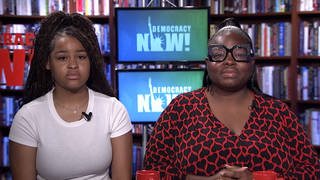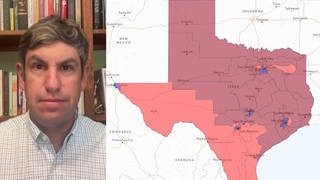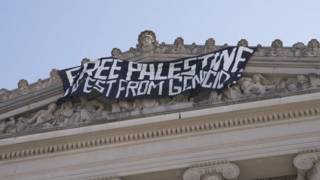
Topics
By Amy Goodman & Denis Moynihan
It has been more than 30 years since a rape and attempted murder occurred in New York City that became known as the Central Park Jogger case. The crime itself was indescribably vicious; the miscarriage of justice that followed—with five African American and Latino boys who became known as the Central Park Five framed for the crime and sent to prison—remains a blight on the criminal justice system. The five boys spent years behind bars, losing their youth in the process. Eventually, their convictions were vacated after the actual perpetrator confessed in jail. His confession was supported by irrefutable DNA evidence. When the teens were first arrested, Donald Trump, then a New York real estate developer, actively campaigned for the death penalty for the young defendants, taking out full-page ads in all of New York City’s major newspapers. To this day, ignoring all evidence, President Trump maintains that they are guilty.
These injustices have been poignantly captured in a damning, four-part Netflix miniseries called “When They See Us,” directed and co-written by Academy Award-nominated filmmaker Ava DuVernay. With this vivid and dramatic work, DuVernay starkly portrays systemic racism that remains all too familiar today.
DuVernay’s telling of the tale focuses on the boys and their experiences. On the night of April 19, 1989, Trisha Meili, a white investment banker in her late 20s, went for a jog in Central Park. She was brutally attacked, raped and left for dead. Later that night, the New York Police Department arrested the five teens, interrogated them for hours upon hours without parents or lawyers present, and eventually charged them with the crime.
The five teens were Yusef Salaam, Kevin Richardson, Antron McCray, Raymond Santana and Korey Wise. Only two of them knew each other at the time of their arrest. As Ava DuVernay told us on the Democracy Now! news hour: “They are not the Central Park Five. That was a political moniker. It was something that was given to them by the press, given to them by the prosecution. It allowed them to be seen as a gang, as a ‘wolf pack,’ and not as Yusef, Korey, Kevin, Antron and Raymond—real people, real boys, with real families, memories, hopes, dreams, that were dashed the day that they were captured at a park.”
DuVernay spends significant time depicting how intensely the five boys were pressured by police to obtain coerced confessions. “This is about the criminal justice system,” DuVernay said on Democracy Now! “Each part of the series, or the four-part film, as I call it, is designed to take you deeper and deeper, to make you further acquainted with different aspects of the system as it stands today.”
Linda Fairstein was head of the sex crimes unit at the Manhattan District Attorney’s Office. She is perhaps most known as the bestselling author of crime novels. In “When They See Us,” Fairstein, played by Felicity Huffman, is shown directing the coercion and attempting to block any due process for the powerless youths. After the series premiered on May 31, students at Vassar College, Fairstein’s alma mater, organized a petition drive that forced her to resign from the college’s Board of Trustees.
While Fairstein was in charge of coercing confessions, the real rapist, Matias Reyes, was still on the loose. He had beaten and begun raping a woman in Central Park on April 17, two days before Meili’s assault. That first victim gave the NYPD a description of him, saying he had stitches on his chin. A local hospital then gave the police the name, Matias Reyes, as someone who fit that description. The police never followed up on the lead. After the five boys were arrested, Reyes went on to beat and rape five women, murdering one of them, Lourdes Gonzalez, a pregnant mother of three.
One of us [Amy Goodman] lived in the same building where Matias Reyes was eventually captured. Her neighbor, his last rape victim, ran down the stairs screaming as he fled. The building doorman tackled him and held him until police arrived. Reyes confessed to several of his crimes, including the murder. Had Fairstein and the NYPD investigated the crimes, in which Reyes had repeated his M.O. again and again, rather than racially profiling and framing the five teens, perhaps those rapes, and the murder of that young mother, might have been prevented.
Korey Wise, the oldest of the five, was tried as an adult. After spending 11 years in prison, during which he was repeatedly beaten and brutalized in prison after prison, he met fellow prisoner Matias Reyes. Reyes confessed that he had raped Meili, and that he had acted alone. Wise served his time, nevertheless, as the others had as well, and was released. A New York State Supreme Court judge vacated all their convictions. The five sued the city and won a settlement of $41 million.
Ava DuVernay’s “When They See Us” is essential viewing. It shows, as she says, “the system’s not broken; the system was built this way.”











Media Options